 As of yesterday, Google is not showing the featured page in organic results. That is, if previously you were ranking in Google’s top 10 and were featured, now you are just featured.
As of yesterday, Google is not showing the featured page in organic results. That is, if previously you were ranking in Google’s top 10 and were featured, now you are just featured.
The official claim is that this has been done for “decluttering” search results.
What does this move mean for web publishers?
Let’s try to figure out together:
Table of Contents
Featured Snippets Don’t Necessarily Reflect the Search Intent
Let’s face it: Featured Snippets have been introduced to give immediate answers. But not ALL search queries that trigger featured snippets are necessarily done to find answers.
For example, if I search for [SEO report], do I want to know what it is or am I looking for templates and examples?
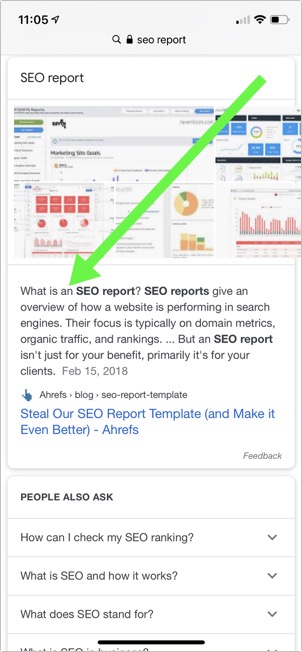
How likely am I to skim through this explanation and scroll right past it to see more actionable results?
And let’s not forget that featured snippets are often enhanced with third-party links and images making the featured page’s prospects to get clicked even lower:
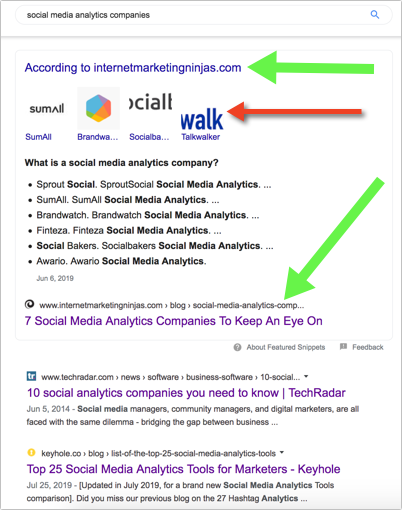
On top of everything else, by design, Featured Snippets are for giving immediate answers. They remove the need to click. Organic search is where people search and click.
Many of my scan & click results on web SERPs show that many test participants (mostly adults) scan the text in the featured snippet, not really notice the link there, but notice the link further down the page.
My hypothesis is the "banner blindness" effect. #SEO #usability
— Shari Thurow, Author (@sharithurow) January 24, 2020
Should I De-Optimize for Featured Snippets Now?
No
The thing is, featured snippet optimization uses a lot of on-page optimization tactics (i.e. keywords in subheads, building indepth content, etc.) that help you increase your organic rankings.
So de-optimizing may hurt your organic positions.
On the other hand, optimizing for answers may boost your organic rankings.
There’s a way to opt out of being featured by using this guide but it doesn’t sound like even Google is sure of the outcome:
Those who wish to retain snippets in regularly-formatted search results but not appear in featured snippets should experiment with setting the max-snippet tag to lower lengths
Should I Opt-out of Being Featured?
It depends! In many cases, having a featured snippet is worse than having both but better than ranking organically:
A1/a.
CTR's will go down for those who had a featured snippet and an organic listing because they will only have the featured snippet now. But the featured snippet alone still might be better than a normal organic listing.— Boyd Norwood – nozzle.io (@boydnorwood) January 23, 2020
I can see how featured snippets can trigger clicks when they match query intent…
If you notice a drop in clicks from Google organic search, and see that you are featured for related queries, you may (again) experiment with opting out and see what happens.
Again, the way Google puts it makes me a bit suspicious of the outcome but we shall see.
On the other hand, if you were ranking #1 and had a rich snippet, this move is like a gift to your competitor. Featured snippet don’t support rich snippets, so in some many cases, I can see web publishers would prefer their organic position.
*shakes fist in air* first they take my 2nd URL, then they take my FAQ Schema. Remember, the FAQ Schema treatment does NOT work on the 2nd page. So if you rank in the FS, say goodbye to the rich result. More deets on this effect: https://t.co/E7sPrOnryK pic.twitter.com/rrHDaGzgWp
— Brodie Clark (@brodieseo) January 23, 2020
How Can I Tell Where I Was Ranking Organically?
There’s a quick hack allowing you to see search results without featured snippets (credit for this hack goes to Kevin Richard)
All you need to do is to add &num=9 to the URL of search results. So using the example above, we see that Ahrefs ranks #6 organically, so being featured should give them a good boost:

How to Interpret Click-Through Data in Google Search Console Now?
If you were featured previously and you are still featured now, your click-through data inside your Search Console Performance section should NOT change because, apparently, Google was showing your featured snippet click-through data previously, not your organic listing data:
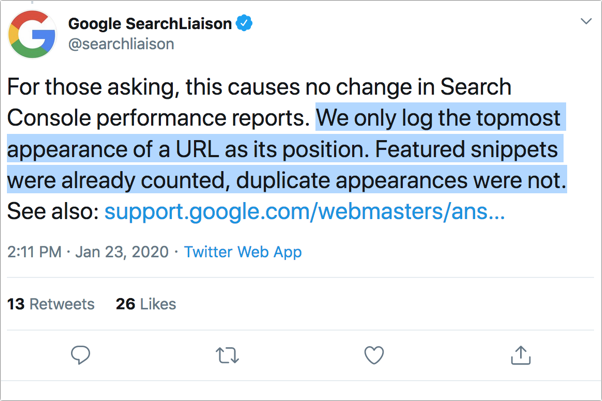
If you were/are NOT featured, you may see a higher click-through though 😉
Why Was That Actually Done?
I wish Google were more transparent with answering this question. I don’t buy the “decluttering” argument. We know they have been testing this move for a while now, so what did those tests show? Did they see people would click the featured snippet enough for them to decide the page may be stripped of their organic position?
Or what did those tests show to prompt them to go ahead with the move?
If we had more information on this, the future might be clearer…
And if there were testing this for a while, how did this happen?
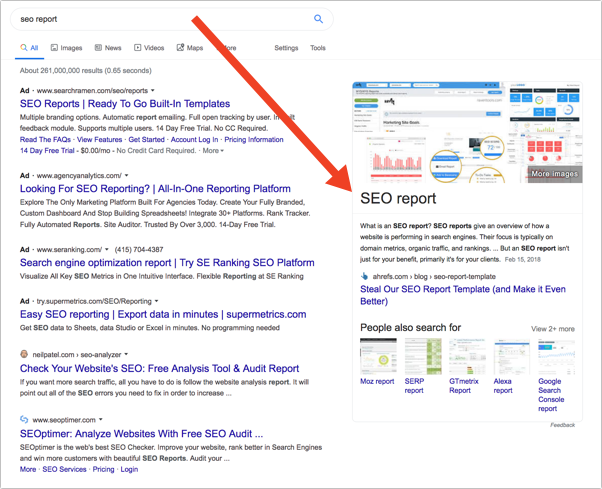
In cases where featured snippets appear to the right instead of being elevated (desktop-only), losing the organic result means losing any search visibility as few people would ever pay attention to that part outside of search results.
In these cases, Google is now re-rolling their deduplication update to still show an organic listing until the featured snippet is moved to the top of organic results.
So does this mean this use case was not even in mind while rolling out this update?
— Vivek Sancheti (@VivekSancheti91) January 23, 2020
And a funnier bug (?) is that the featured page hasn’t just vanished from search results. It will show up on top of page #2. So if you have set to see 100 results per SERPs, you’ll see your featured page ranking #101! Whoever has come up with this joke must have a weird sense of humor…
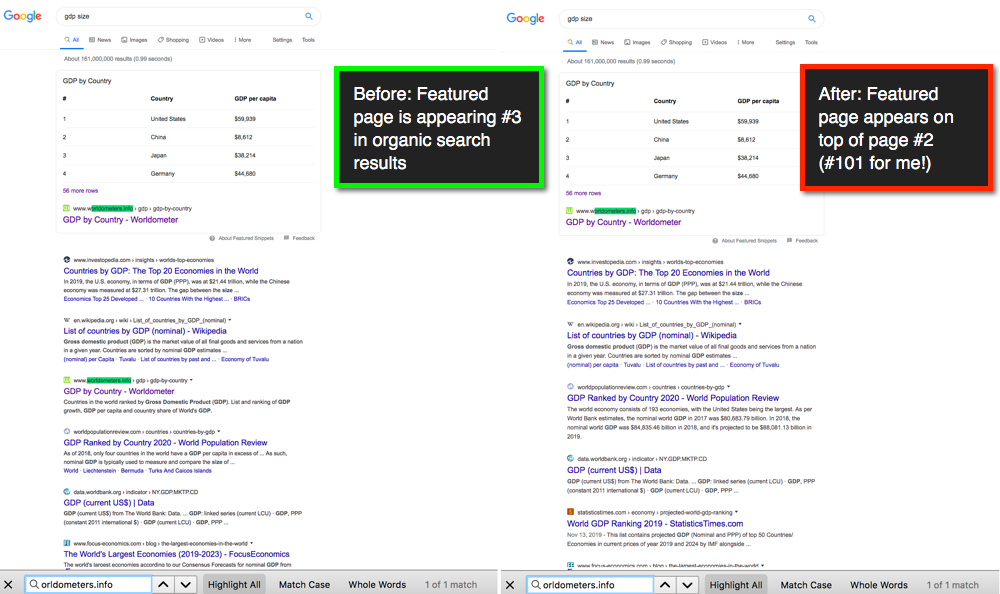
Your Thoughts?
There are more questions here than there are answers but one thing is clear: The move is making the web publishers’ jobs much harder as now they have to decide whether being featured helps or hurts them on a case-by-case basis.
What do you think?
Thinking: If de-duping the featured snippet and organic listing helps users by decluttering results wouldn't de-duping paid and organic listings do essentially the same thing? #seo pic.twitter.com/Kq41kZn4Qd
— AJ Kohn (@ajkohn) January 23, 2020
